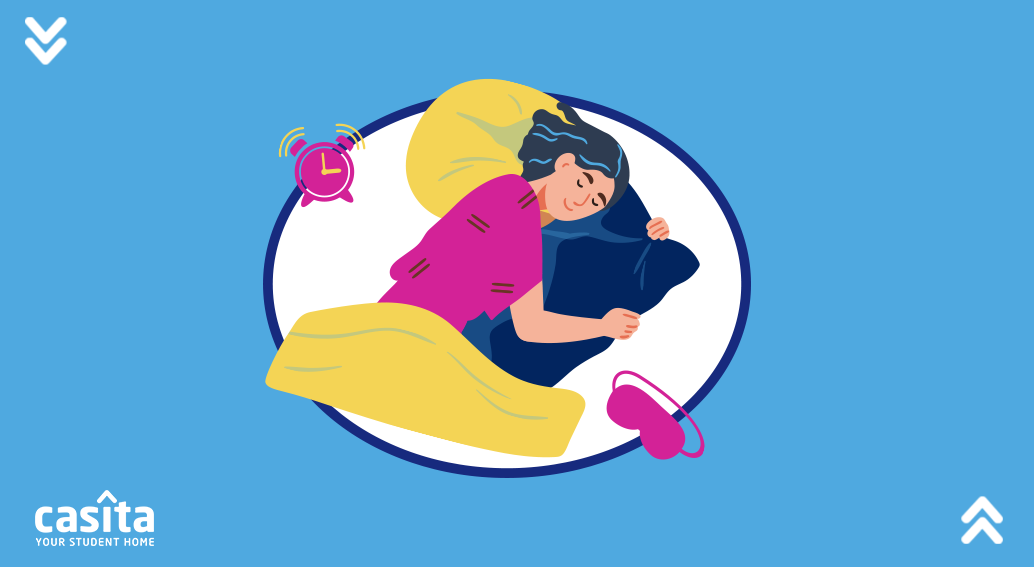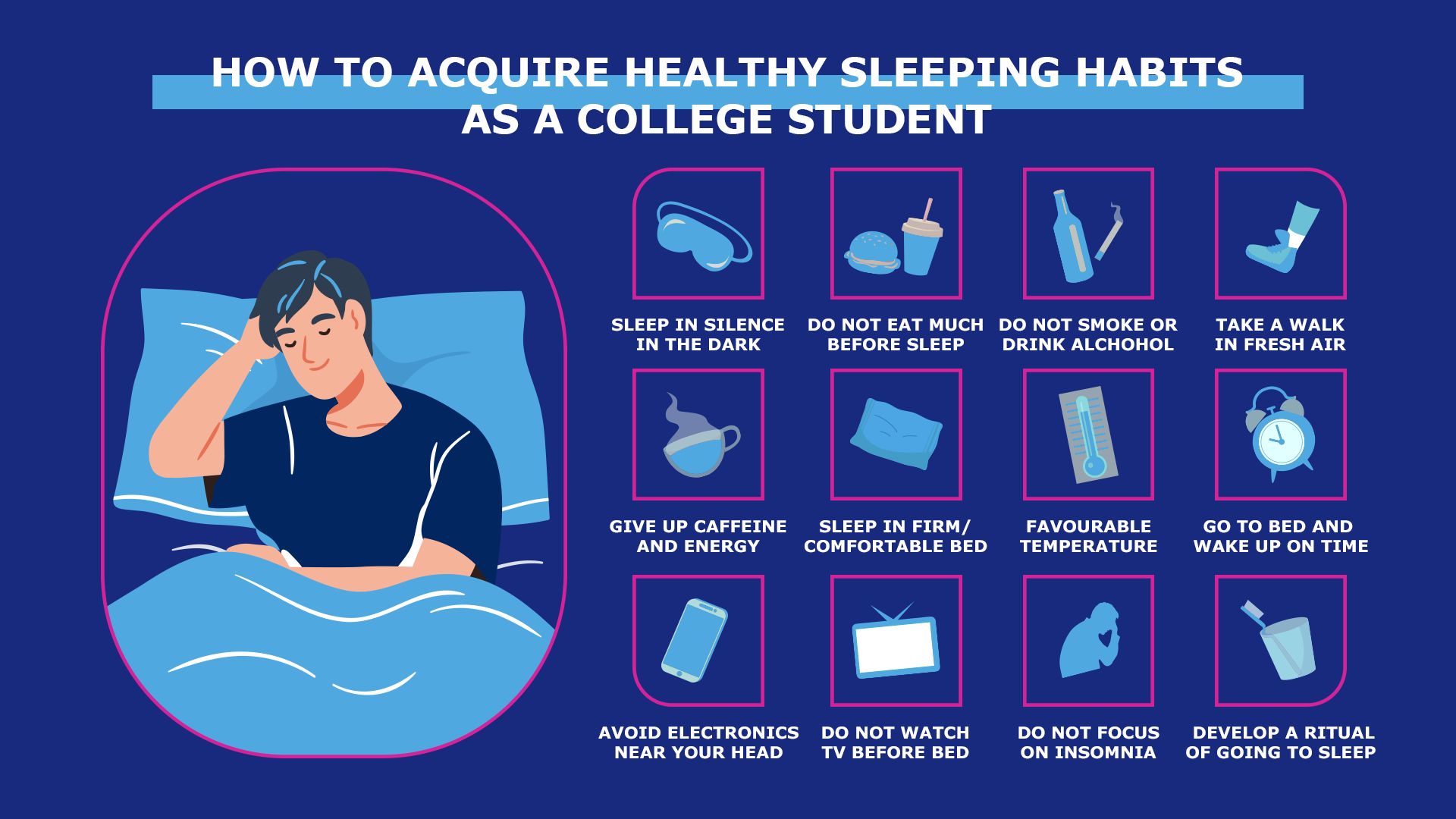How to Acquire Healthy Sleeping Habits as a College Student
Tips and Advice
5 mins read
Share

Updated at: 16 December, 2024
Published at: 13 December, 2022
By Allaa Ashraf
How to Acquire Healthy Sleeping Habits as a College Student
Tips and Advice
5 mins read

Updated at: 16 December, 2024
Published at: 13 December, 2022
By Allaa Ashraf
Share
College students are forced to study for tests and study for jobs, but how much time can they really afford to waste sleeping? Sleep is vital to the body, and its need is as essential as food. There can be serious consequences to a lack of adequate sleep among college students, just as healthy sleeping habits can have a huge impact on your quality of life. So, which one is it going to be for you?
By adjusting your sleeping habits, you will be able to effectively manage your time in college. Students’ poor sleeping habits may have immediate negative effects on their hormones, exercise performance, and brain function. Students engaging in activities that cause stress or anxiety find it difficult to fall asleep, get sound and deep sleep, or remain asleep.
Before we get into the specifics, though, you need to be aware that sleep is a precious commodity for college students, who often have to manage extra time and have less opportunity for uninterrupted slumber. But a good night's sleep doesn't have to be hard—here's a guide to help you get the sleep you need so you can be alert and ready to learn the next day.

Adhere to a Consistent Sleep Schedule
This is one of the most important healthy sleeping habits. Try to go to bed and wake up at the same time every day. This assists your body in regulating your circadian rhythms and adjusting its biological clock. It also makes you sleep better and be more focused when you’re awake. Avoid not getting enough sleep because of college stress or university projects and assignments.
Studies have shown that poor sleep has instant negative effects on your brain function, so you’re actually making it worse this way instead of boosting your functionality. On weekends, avoid sleeping more than you should. You’re, of course, allowed to sleep for one extra hour or so, but don’t miss your natural sleep-wake rhythm. Instead, you can go for a midday nap.
Create Bedtime Rituals
Having a set of activities, no matter how minor, to perform every night before going to bed not only helps you sleep better but also prepares your brain and body for bedtime. Some of the best relaxing bedtime rituals for students are taking a warm bath, reading a piece of flash fiction, or listening to music. When these pre-sleep activities are relaxing, your body thanks you for them with a night of deep sleep.
By putting bright lights on when studying in the morning and dim lights on an hour before you go to bed, you can also manage your circadian rhythms. This helps your body separate sleep time from activities that require a high level of brain function, physical activity, or excitement. Remember, your body needs time to shift into sleep mode!
Get Out of Bed Fast, It’s a Trap!
Another significant healthy sleeping habit is getting up quickly as soon as your first alarm rings, not the one you snooze. It is crucial that you get out of bed as soon as possible after a restful night. Overnight sleep quality might be impacted by staying in bed too long after waking up. You might even find yourself nodding off when it's time to get the day going.
Don’t fall into that pit of snoozing your alarm and going for an extra hour or so, and definitely don’t go through your social media the first thing when you wake up. Get up, have a good bath, and then you’re just about ready to set off for your busy day on campus!
Get Smart about Power Naps
Keeping the duration of your power nap within its limits is a lifesaver! Naps during the day should be less than 30 minutes. Power naps are designed to help you get through the day without interfering with your nighttime sleep, so avoid afternoon naps if you have trouble sleeping.
Taking a nap on campus might be a bit challenging, so get yourself ready with some earplugs, but don’t do it in the library or your classroom, of course. Bear in mind that napping to fight after-dinner drowsiness is not effective. To get over it, do anything that’s mildly stimulating, like washing the dishes, preparing your notebooks for tomorrow’s lectures, or getting clothes ready for the next day.

Exercise Regularly
This one is quite important as well. Regular exercise, like walking, cycling, or any vigorous activity, will drastically improve sleep quality and promote healthy sleeping habits, especially when done on a regular basis. Although it’s widely spread that exercising before bedtime is a no-no, it’s a myth. Sometimes exercising in the evening and then going home exhausted will put you to sleep faster. Make sure your student accommodation has an on-site gym so you can exercise whenever you want.
Stay Healthy
Keeping a healthy diet helps you balance your body’s hormones and your brain’s activity. Avoid eating heavy meals before going to bed, but some specific snacks promote sleep, like whole-grain crackers, a handful of walnuts, one banana, or a mug of chamomile tea. It’s preferred to get any of these snacks 30-45 minutes before going to bed. Also, if you stray away from smoking, consuming alcohol, and caffeine, you won't disrupt your sleep. Caffeine and nicotine are stimulants that interfere with sleep.
Use Bed for Sleeping Only
It’s proven that using your bedroom only for sleeping makes you sleep better. Since your student room might be an en suite, it’s better to have some ground rules for using the bed for sleeping only. Studying or watching TV while in bed might make it a place for activities and stress rather than where you should relax and rest. Set the right environment for yourself as well; it’ll make it easier for you to sleep. Consider using blackout curtains, eyeshades, earplugs, and humidifiers. So no more complaints about noisy college roommates!
Make Your Own Sleeping Sanctuary
The best student sleeping habits begin with avoiding the use of electronic devices before bedtime, and that’s because the screen light from these devices activates the brain. Also, one of the most important things to keep in mind is your mattress and pillow. Make sure they’re comfortable and that they smell nice. Lavender and vanilla scents are the most popular ones used in bedrooms to stimulate sleep. Also, make your bedroom peaceful and dark to aid sleep. If you share a room, try using earplugs and an eye mask to create a peaceful sleeping environment.
And that’s all, folks! That concludes your comprehensive guide to the best healthy sleeping habits for college and life in general. Being able to develop a healthy sleeping routine is part of the set of skills students must have because how else would you manage your time? How else would you be able to balance your studies, college activities, and social life?
If, after trying all these things, you still have trouble sleeping, you might need to speak with your doctor.
Frequently Asked Questions
1. How much sleep is healthy for a college student?
Experts recommend 7 to 9 hours of good sleep for students and anyone, in fact. This helps them wake up fresh, focused, and ready to go about the day!
2. Why is it hard for college students to sleep?
For a range of reasons, students find it more difficult to sleep throughout the week. Numerous things, including stress, staying up late, excessive caffeine consumption, and big meals right before bed, might contribute to this.
3. How do college students solve sleep deprivation?
As we mentioned earlier, there are plenty of healthy sleeping habits that help promote a good night’s sleep. These include a consistent sleep schedule, power naps, regular exercise, and healthy food.
Tips and Advice
By Allaa Ashraf
Share
Tips and Advice
Updated at:
Published at:
By Allaa Ashraf
Share


